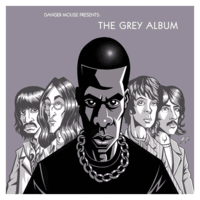The Copyright Wars

So the never ending debate on copyright laws rears its ugly head in another creative industries class. Just those large, million-dollar record companies suppressing the re-characterization and renewed expression created by a mash-up with another song, which sounds perhaps just as good or even better as the original songs. But yes, those record companies do own the original songs used to create the mash-up.
That, undeniably is where the problem is. The recent dispute over The Grey Album (pictured) set a revolution for authors of mash-up songs. As the website Illegal Art relayed, Sony dropped the case against The Grey Album. Supporters of the album refused to back down, and the website used to distribute the album moved to the Online Policy Group (a free speech organisation). The executive director of Stay Free! Magazine sent Sony this letter and Sony soon dropped the case, likely due to the lack of a strong argument. This was a remarkable outcome that certainly sets a precedent for future 'mash-up authors.' Online activism had definitely contributed to Sony's retreat.
Rimmer (2005, p46) also described grounds for which The Grey Album had a fair use defence: it was for a non-commercial purpose and it did not substitute for purchases of the Beatles White Album. It is these exact grounds that should be used in a reformation of copyright law. Why should we keep record companies from stifling the "socially valuable art" that has been created from aspects of popular culture (Rimmer, 2005, p42), whilst it still retains some of the artists' own expression?
I do understand that record companies do need to draw the line somewhere in order to keep people from earning money of the work of someone else. But that line needs to reside between a DJ creating a mash-up designed for non-profit distribution, and selling that mash-up to people via online or offline stores.
Otherwise DJs will be forced to keep their creative pieces underground, away from the popularity and recognition of which it may deserve. Copyright laws need to shift to take into account these people and recognise they are creating a completely new piece of music, although only when distribution is not-for-profit. Enevitably, record companies will create backlash at others who are making profits off songs they invested a lot of money and time in to record.
It is fortunate that we have online activist websites who ultimately fight those money-hungry giants! Ahh, I sound like my grandmother, haha.
You can download the Grey Album here.

0 Comments:
Post a Comment
<< Home